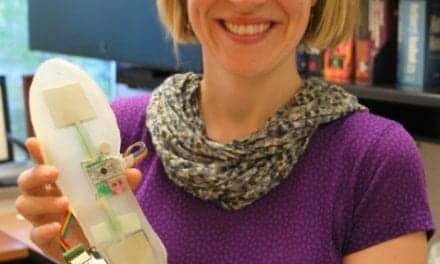Cryopreserved Umbilical Cord allograft TTAX01 is a promising adjunct therapy for the management of complex, non-healing Wagner Grade 3-4 diabetic foot ulcers (DFUs) complicated by osteomyelitis, according to results from a Phase 2 open label multicenter pilot study.
Results of this 1-year study are published in the peer-reviewed journal Wound Repair and Regeneration, Amniox Medical Inc announces.
The objectives of the study were to examine the safety and efficacy of TTAX01, plus standard of care, in achieving complete wound closure of complex non-healing DFUs with evidence of exposed bone, tendon, muscle and/or joint capsule and clinical suspicion of osteomyelitis.
The results demonstrate an overall 86.2% wound closure rate and are comparable to previously reported results using the commercially available Cryopreserved Umbilical Cord NEOX in a retrospective study. In that study by Caputo, 26 of 33 (79%) of the wounds achieved complete wound closure in 16 ±9.3 (range: 4–44) weeks with 1.2 ± 0.4 NEOX applications. The average wound size was 16 ± 18 cm, a media release from Amniox Medical Inc notes.
“Although there have been numerous other studies published on the management of DFUs, the majority of these studies have been with less severe and more superficial Wagner Grades 1 and 2 DFUs – where there is no infection and little or no exposure of muscle, fascia, joint capsule, or bone. More severe and higher-grade Wagner 3 and 4 DFUs presenting with exposed bone and the presence of osteomyelitis are usually excluded in clinical trials as they are the most challenging wounds to manage,” William A. Marston, MD, Vascular Surgeon at University of North Carolina at Chapel Hill and lead investigator for the Phase 2 trial, says in the release.
“We’ve chosen to go after the most severe DFUs to address a critical, unmet clinical need with the goal of identifying a successful treatment option to help this diabetic population exhibiting high morbidity and mortality. We are looking forward to the Phase 3 trials to be initiated soon, which will provide an opportunity to confirm these results in larger pivotal trials.”
The study, conducted at 11 US healthcare facilities, included 29 patients. An independent medical reviewer evaluated images to confirm each DFU closure as assessed by the principal investigator. Trial results showed that only an average of 1.5 applications were necessary to facilitate complete wound closure in 25 of the 29 total patients.
“The results of this Phase 2 study show not only higher than standard of care healing rates, but also fewer applications than studies using other amniotic membrane and similar wound care products for less severe wounds, which is ideal in today’s COVID-19 environment where we are doing all we can to reduce these high-risk patients’ exposure to a virus that could have dire consequences for their health,” says Amy Tseng, President and Chief Executive Officer of TissueTech.
“The findings in the Phase 2 trial related to less frequent applications and persistent wound closure are of particular importance right now and offer new hope for a future treatment option in this vulnerable population where we see many wound care centers leveraging less frequent patient visits to the clinic to reduce risk as a result of the COVID-19 health crisis,” she adds.
[Source(s): Amniox Medical Inc, PR Newswire]





